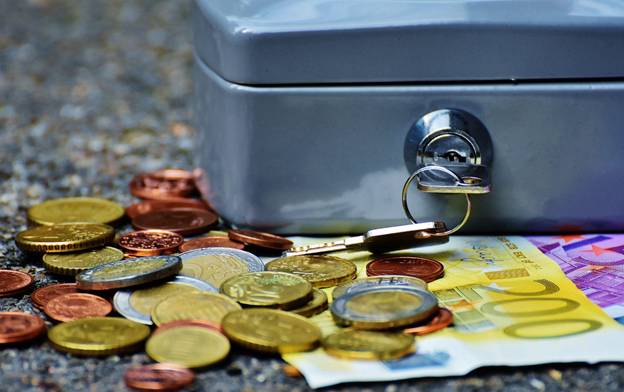One of the most difficult financial decisions we are routinely faced with is spending the money we have today or saving it for the future. Naturally, we all have a desire to spend money. It buys us the things we want, from furniture and food to houses, cars, and vacations. While you might want to spend your entire paycheck the moment it reaches your bank account, saving for tomorrow is crucial for your financial health.

The Case for Spending
There isn’t much left in the world that doesn’t cost money. Try as you may, avoiding spending altogether is impossible. Whether it’s a mortgage, student loans, the electric bill, or groceries, you’re going to have to spend some of your money to pay for necessities.
Most of the spending you do today will fund expenses necessary to living a healthy life. For most people, that means paying for accommodation, transportation to and from work, insurance, food, and utilities. Sometimes, unpleasant surprises force you to spend money, like a leaky roof or a medical emergency. You can’t get around spending on these essentials; fortunately, you can make smarter decisions by choosing an affordable lifestyle and living below your means.
Can Money Buy Happiness?
The age-old question of whether money can buy happiness doesn’t have a definitive answer. In general, money can’t buy happiness, but it can be a useful tool that, if used properly, can help facilitate a happier life.

Beyond spending to meet your basic needs, it’s important to recognize that money can and should be used for your enjoyment. This isn’t to say money should be spent frivolously, of course. The critical point here is that money should help you in pursuit of the activities you enjoy. You have unique hobbies and interests that most likely cost money. Maybe it’s playing an instrument or video games; perhaps it’s pottery or hiking. Though these aren’t necessities, if your hobbies bring you joy, you need to see the value of spending money on them.
Even if it’s not funding a hobby, money spent beyond the bare necessities can help contribute to your happiness. Take a vacation, for example. Spending time with the people you love and creating lifelong memories isn’t something you can put a price tag on. However, the flight, hotel, restaurants, theme parks, museums, and gift shops come with a price tag.
Spend, But Save First
Creating a budget that addresses the need to save for tomorrow but still spend today can be a challenge for anyone. An effective way to resolve this is by saving first and spending second. Many experts advocate for the 50/30/20 rule when budgeting. 50% of your income is allocated to your needs, like housing; 30% is for discretionary spending; 20% goes directly to your savings. The easiest way to ensure you stick to this budget is by saving your 20% first, then planning your spending working within the remaining 80%. This way, you guarantee you’ll still be saving a healthy amount even if you spend the entirety of that 80% every month. Adopting the 50/30/20 rule and starting with saving 20% first is a simple way to maintain your finances and help guide you in living below your means.
Saving to Prepare for Emergencies

You always need to be prepared for emergencies, which is one of the reasons it’s so important to try and save as much as you’re reasonably able to. Your savings can take a big hit in the event of an emergency, but that’s exactly what you’re saving for. While that hit can be painful in the short term, the alternative is far worse. Saving is much more than just a way to cover an unexpected expense; in reality, it’s what will protect the rest of your assets. If an emergency does arise, the last thing you’ll want to do is carry high-interest debt on your credit card or worry about defaulting on an existing loan.
The Power of Compounding Interest
Compounding interest isn’t just some strange phenomenon: it’s one of the reasons why those who save from a young age usually end up retiring sooner and more comfortably. Investing early and giving your money time to grow can result in a much larger nest egg than if you delay savings until later in life.
For example, if you invest €1,000 at age 25, and it grows at an average of 6% annually, you’ll have over €3,200 by the time you’re 45. If you invest the same €1,000 at age 35, you’ll only have €1,790 by age 45. During your early professional career, you might not be able to save a lot of money, but you do have the invaluable asset of time, which can be used to grow your savings for the future. By investing early, you can harness the power of compounding interest to make your savings today go further tomorrow.
Striking a Balance Between Spending and Saving
There are many ways to succeed when it comes to finding the optimal balance between spending and saving. The 50/30/20 rule is just one common strategy that’s popular mainly due to its simplicity. The critical takeaway is that your best course of action will be to make a plan and stick to it. While your monthly spending habits can vary, you should automate your savings and make it your top priority to save a portion of every paycheck consistently.
As with so many other things in life, the balance between spending today and saving for tomorrow can be a delicate one. Since no one knows what the future holds, and because compounding interest is one of the best ways to help you grow your money in the long-term, saving for tomorrow is an investment that will pay dividends to your future self.
Remember, even if it seems insignificant, every bit you save counts. In pursuit of saving as much as you can, don’t forget that money is still an excellent tool for helping you do the things you enjoy and that it’s essential to treat yourself every now and again.